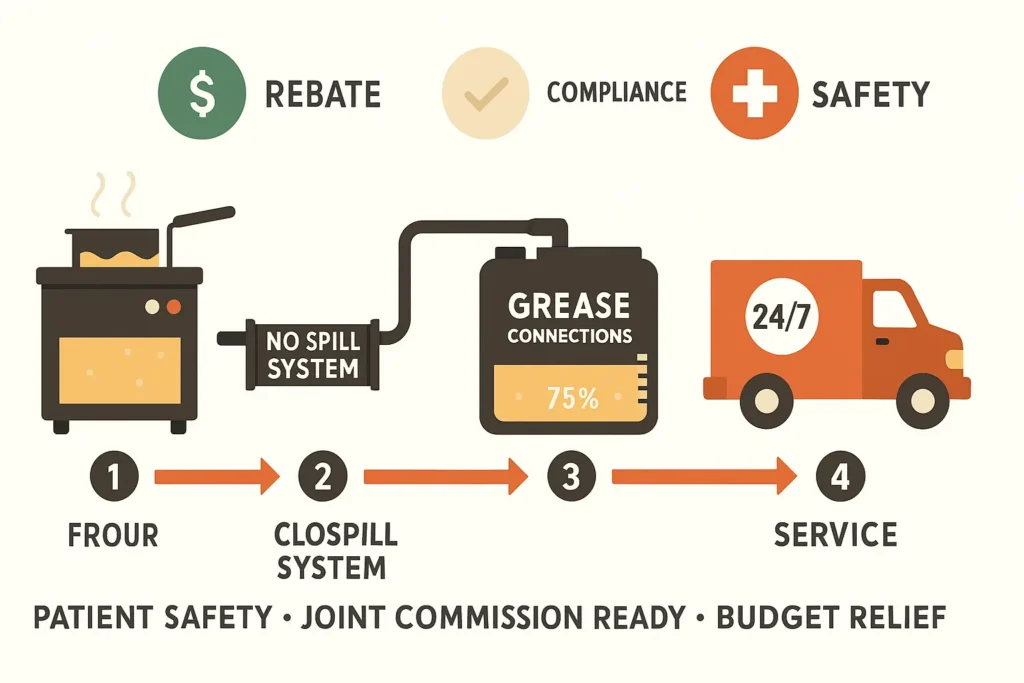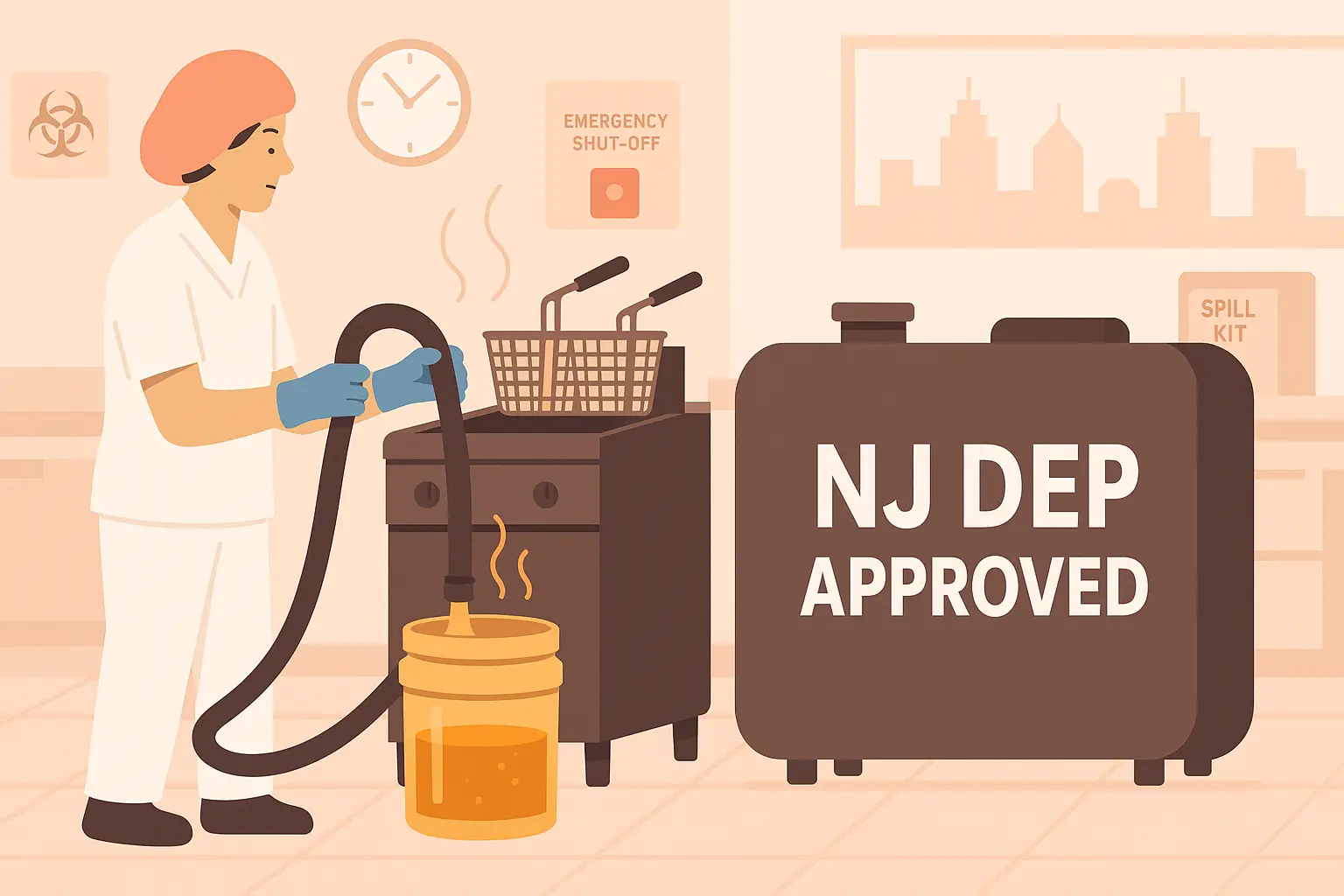Table of Contents
The Hidden Risk in Every Hospital Kitchen
Hospital & Healthcare Kitchen Grease isn’t just messy it can foster bacteria that compromise sterile wards and clog municipal mains, triggering patient area shutdowns. The CDC warns that moist, organic waste supports pathogens if ventilation or drainage falters. NJ’s Passaic Valley Sewerage Commission (PVSC) classifies fryer oil and interceptor waste as regulated pollutants. Mix in NFPA 96 fire load concerns cited by The Joint Commission and you have a triple threat infection, backups, and fires.
NJ FOG Rules & Joint Commission Compliance in One Page
Section 405 of PVSC rules requires every medical center cooking oil disposal system to include a Best Management Practice plan and monthly log. Joint Commission surveyors expect a written plan that references NFPA 96 inspections and proves grease removal devices are serviced. The NJDEP adds a storage tank rule: above ground, leak proof, and labeled “Used Oil Do Not Dump.” Miss any item, and fines or worse, discharge permits can be suspended.
Fryer Oil Infection Control: How Clean Oil Protects Patients
- Used oil oxidizes; aerosolized aldehydes land on vents and may harbor Gram negative bacteria. Infection control teams should:
- Keep fryers covered during cool down.
- Transfer oil through a closed hose to the on site tank to avoid splashes, a best practice echoed in Grease Connections safety guide.
- Sanitize transfer wands daily with 200 ppm quaternary solution (CDC threshold).
These steps cut airborne contaminants and satisfy “environmental services” questions during audits.
The 30 Day Grease Trap Schedule that Passes Audits
PVSC mandates cleaning “at least once per month,” with a log signed by staff or your used collection company. EPA’s 25 % rule pump when grease plus solids equal a quarter of tank depth remains the national benchmark. Record each pump out on a manifest that lists volume, tank ID, and destination facility. Keep logs three years; inspectors will ask.
Rebate Math: Turning Waste Oil into Budget Relief
Global bio diesel demand lets NJ hospitals earn a “rebate oil healthcare facility” credit that floats with yellow grease prices. Local collectors such as Grease Connections report paying hospitals when oil purity stays high water < 2 % and solids < 1 % and volumes top 200 gallons/month. Pair those payments with SAF biodiesel incentives that reward diverting organics from landfill. Result: sustainability points and cash back.
Backup Pickup & Emergency Spill OR Shutdown Playbook
Even the best schedule fails when fryers go down at 2 a.m. EPA’s SPCC rule treats vegetable oil spills like petroleum events. Post this number near the fryer: DEP Hotline 1‑877‑WARN‑DEP. Use absorbent socks within two minutes, isolate power, and call a 24/7 backup pickup provider Grease Connections advises keeping a spare 70 gallon caddy on wheels for fast swap outs. One hour is the informal Joint Commission threshold before an area shutdown merits documentation.
Grease Manifest & Hospital Audit Essentials
Auditors want a chain of custody from fryer to biodiesel plant. Each manifest must include generator EPA ID, date, gallons, and receiving facility mirroring California’s model that NJ agencies increasingly reference. Digital logs work if printed on request; A1 Tank notes that missing volumes trigger citations even when traps are clean. Best practice: scan and cloud store every ticket the day of service.
| Manifest Checklist | Minimum Data |
|---|---|
| Tank ID | Matches floor plan |
| Gallons pumped | ±2 % accuracy |
| Destination | RCRA compliant processor |
| Staff signature | Full name & time |
Oil Disposal Rules Made Simple for Kitchen Teams
NJDEP’s used oil guide says once oil is mixed with solvents or mop water, it becomes hazardous waste. OSHA reminds teams that any spill response must include PPE heat resistant gloves and eye shields to meet worker safety rules. Translation for your staff: keep oil pure, log every transfer, label every container. Simple habits avoid complex fines.
City Spotlight: Meeting Local Codes from Newark to Atlantic City
- Newark & Jersey City: PVSC enforces the one month trap rule plus surprise inspections.
- Paterson & Elizabeth: Grease permits issued by Passaic County have manifests on site.
- Edison & Toms River: Local sewer utilities follow EPA’s 25 % rule and require annual interceptor certification.
- Trenton & Camden: Downtown zones ban outdoor drums use locked, weather proof tanks like our 140 gallon rectangular model.
- Hoboken & Atlantic City: Flood prone; elevated indoor tanks cut spill risk.
(Need specifics for your kitchen in Newark? Our Grease Service can help.
| City | Typical Pickup Window | Permit Issuer |
|---|---|---|
| Newark | 4 a.m. to 6 a.m. | PVSC |
| Jersey City | 3 a.m. to 5 a.m. | PVSC |
| Atlantic City | 2 a.m. to 4 a.m. | ACUA |
Next Steps: Keep Grease in Check, Keep Patients Safe
A monthly grease trap schedule, a rebate deal that funds new equipment, and an emergency spill plan are the trifecta that keep kitchens running and Joint Commission reviewers happy. Grease Connections advises drafting your BMP this week our compliance team can walk your facility through setup, manifests, and backup pickup so you never miss a meal service or audit.










